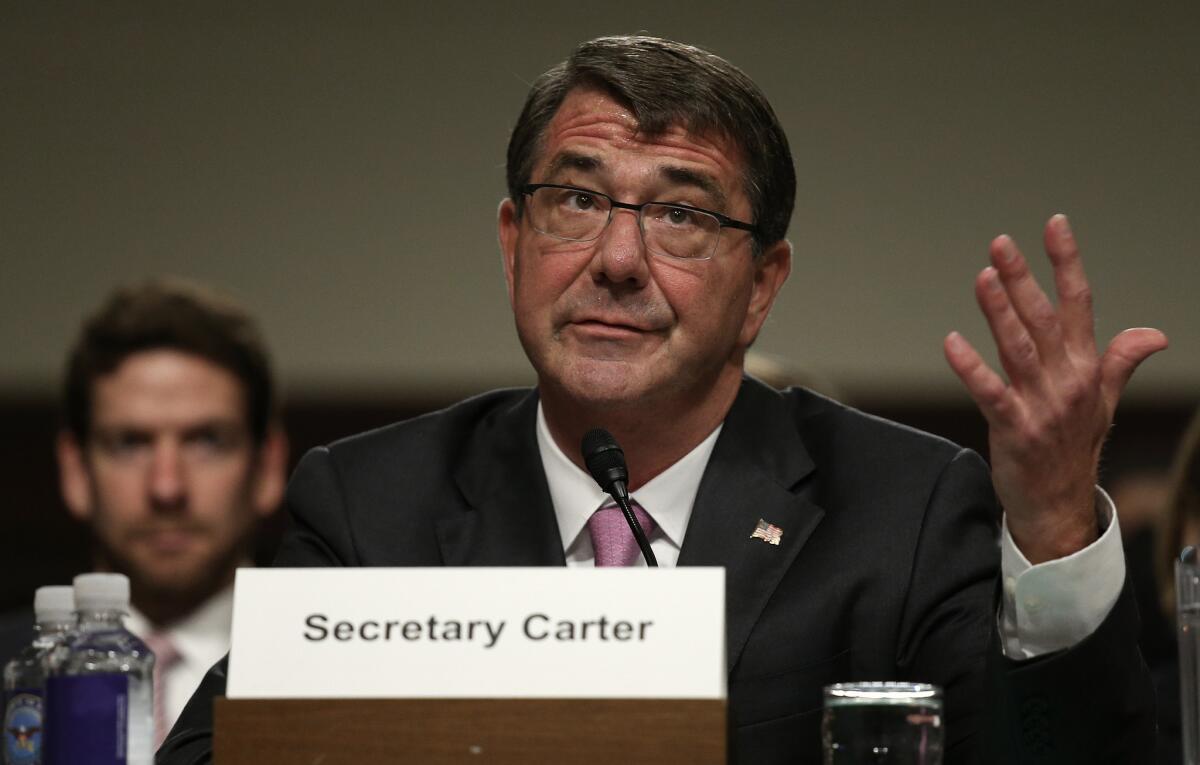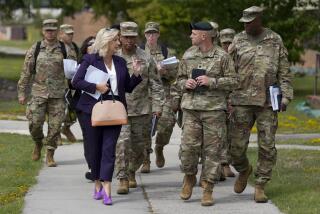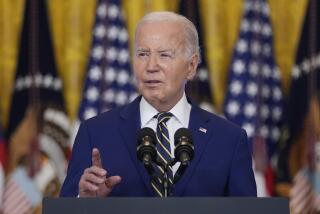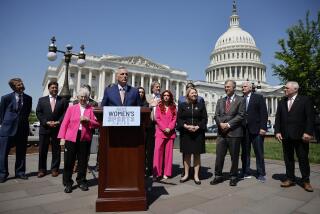Pentagon moves toward lifting ban on transgender troops

Defense Secretary Ashton Carter.
Reporting from Washington — The Pentagon took a significant step Monday toward lifting its ban on allowing transgender men and women to serve in the military, announcing a six-month study designed to clear the way.
The study will “start with the presumption that transgender persons can serve openly without adverse impact on military effectiveness and readiness, unless and except where objective, practical impediments are identified,” Secretary of Defense Ashton Carter said in a statement announcing the move.
“We must ensure that everyone who’s able and willing to serve has the full and equal opportunity to do so, and we must treat all our people with the dignity and respect they deserve,” he added.
The Pentagon does not have a precise count of how many transgender men and women are in the services now, since they face discharge if they reveal their identities. The Palm Center, a research institute based in San Francisco, estimates there are about 15,500 transgender members of the U.S. military, “making the Department of Defense the largest employer of transgender people in America.”
The Pentagon’s plan is designed to remove one of the last discriminatory hurdles in who can serve in the military, treating gender identity on par with race, religion, color, sex or sexual orientation.
“Transgender men and women in uniform have been there with us, even as they often had to serve in silence alongside their fellow comrades in arms,” Carter said in his statement. “The Defense Department’s current regulations regarding transgender service members are outdated and are causing uncertainty that distracts commanders from our core missions.”
The Pentagon currently bans transgender troops from openly serving, and policy dictates that they be discharged if discovered.
Under the new plan, the Pentagon will create a working group, made up of military and civilian personnel representing all the services, to study the implications of allowing transgender people to serve openly for the first time in the Pentagon’s strait-laced history.
In the meantime, any cases of service members who identify as transgender will have to be reviewed by officials at the highest personnel echelon in the Pentagon before any could lead to a service member being discharged, Carter’s statement said.
Both the Army and the Air Force have worked to be more flexible by requiring senior officials to approve service members’ discharges on a case-by-case basis.
The move came nearly four years after the formal end of “don’t ask, don’t tell,” a 17-year-old law that barred gays and lesbians from serving openly in the military. Under the old law, if they revealed their sexual orientation, they could be kicked out.
Over the years, thousands of men and women in uniform were expelled. Openly gay civilian employees at the Defense Department faced similar discrimination until 1995 because they often could not obtain security clearances needed to work in national security agencies.
Lesbian, gay, bisexual and transgender, or LGBT, groups applauded the Pentagon for opening the door to equality for transgender soldiers.
“Transgender Americans have every right to serve their country openly and honestly, and for far too long, this discriminatory ban has robbed them of the dignity of doing so,” said Chad Griffin, president of Human Rights Campaign.
“The time for ending the military’s long-standing ban on transgender service is long overdue.”
Conservative advocacy groups, such as the Washington-based Family Research Council, decried the Pentagon’s move.
“Allowing the Obama administration to use the military as a tool of social re-engineering will only undermine morale, unit cohesion, and readiness,” said William G. Boykin, the group’s executive vice president and retired Army lieutenant general. “It’s time that we allow the military to focus on its only job — defending our country against its enemies.”
The American Military Partner Assn., an organization of LGBT military families, issued a report in March with the Transgender American Veterans Assn. that outlined harm inflicted by the regulations on military families.
“No one should be forced to choose between defending the country they love and being true to their authentic self,” the report said. “The outdated regulations serve no purpose and only dehumanize and prevent qualified and capable individuals from enlisting and serving. The ban perpetuates trauma to all those involved, both the service member and their family.”
For more on the military, follow @WJHenn.
More to Read
Sign up for Essential California
The most important California stories and recommendations in your inbox every morning.
You may occasionally receive promotional content from the Los Angeles Times.











